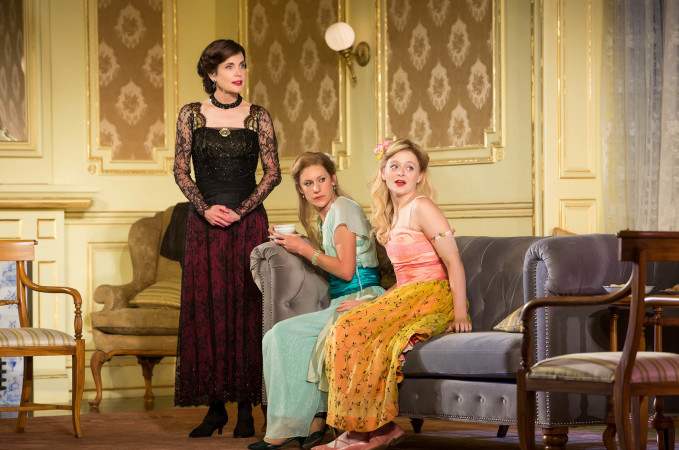Time and the Conways
Reviewed by Elizabeth Ahlfors

Elizabeth McGovern, Charlotte Parry and Anna Baryshikov in Time and the Conways. Photo by Jeremy Daniel.
Reviewed by Elizabeth Ahlfors
Unlike her role as the loving matriarch of Downton Abbey, Elizabeth McGovern returns to the Broadway stage in J.B. Priestley's Time and the Conways as well-to-do Mrs. Conway of Yorkshire, a devoted but narcissistic widowed mother of six. The Roundabout Theatre Company revival at American Airlines Theater focuses on one family's desires and declines from a promising post-war 1919 to a world in collapse in pre-war 1937. A period piece, yes, but the period has clear references to the world today.
How did a downfall destroy this once charismatic family? Despite hesitant direction by Rebecca Taichman (Indecent), the play features a fine ensemble of players. It opens on the 21st birthday of daughter Kay (Charlotte Parry), a sensitive, budding writer who is prone to premonitions. Her sisters flutter about, donning costumes for lively games of charades and McGovern, their mother, a former singer, joins in their fun and is easily coaxed to entertain the guests.
The youngest, most vivacious Conway, Carol (Anna Baryshnikov) dances around the room, a charismatic sprite ready to embrace love and life. Family beauty, Hazel (Anna Camp) is frivolous and self-involved, most like her mother. Brook Bloom plays Madge, a passionate socialist. Wandering around the edges of the elegant drawing room is Alan (Gabriel Ebert), the reticent oldest son. Robin (Matthew James Thomas), just home from WWI in his snappy RAF uniform, is his mother's favorite, ready to conquer the future, if only he can decide what he wants to do.
Guests include stuffy Ernest Beevers (Steven Boyer), eager to meet the flamboyant Conway family, especially the beautiful Hazel although the girls and their mother look down on him, laughing at his speech and demeanor. They do not notice hints of Beever's future significance. Another guest, giggly Joan Helford (Cara Ricketts), ignores the enticements of Alan and only has eyes for Robin. Family friend and solicitor, Gerald Thornton (Alfredo Narciso), seems temporarily taken by the outspoken views of Madge.
The tedious first act flails about with its highpoint introducing characters who are not fully detailed but defined in perfunctory sketches. Forecasts of tragedy shadow the face of Kay and at the end of Act I, a visually creative set change by designer Neil Patel eloquently speaks for the vicissitudes of time. Imaginative lighting by Christopher Akerlind modulates the aura and a scrim separates the opulent set of 1919 to the time-worn version in 1937. This staging is the most evocative display of Priestley's experimentation with J.W. Dunne's philosophical theories of time and its non-linear continuum.
Thus, Act II, 1937, reflects the Conways' faded elegance, mirroring the fluctuations of Britain's upper middle class over the years. Kay is approaching 40 and while fashionable in Paloma Young's costumes, she is bored and dissatisfied with her career and life. The family is fractious. Her outspoken sister, Madge, is now a matron in a girls' school. Beautiful Hazel, ironically, married Beevers, the working class wannabe who climbed high on the financial ladder. Brother Alan is a modest clerk and Robin, his mother's wonder boy, married Joan but turned to alcohol and never made anything of his life or his marriage. Carol, the youngest and liveliest, has long died.
When solicitor Gerald tells the Conways that they are broke, you can erase all memories of Cora Grantham from your mind. While McGovern's Mrs. Conway talks of loving her children, she shows flashes of cruelty, looking out for her own interests first and expecting Beevers now step in and to help her financially. The worm, however, has turned, and Beevers sneers at the wealthy family who once derided him.
Recognizing the failed fortunes of the family, Kay remembers her early premonitions and sighs to Alan, "There's a great devil in the universe, and we call it Time."
Her brother, satisfied with his unassuming life, replies. "Time's only kind of a dream, Kay...(It) doesn't destroy anything. It merely moves us on, in this life, from one peephole to the next."
Ebert's Alan stands out as the gentle giant in this play while Boyer as Beever is a self-absorbed and mean-spirited bully. Anna Baryshnikov's Carol is eye-catching and graceful on stage and McGovern does a fine job as the self-serving doting mother.
A brief third act flashes back to the 1919 party pointing to wrong choices, greed and selfish behavior that led to the collapse of the Conways. As time passes and through old memories or dreams of the future, we can't help but ponder the changes in this country over the next decades.
Time and the Conways
American Airlines Theater
227 West 42 Street, NYC
Previews: Sept. 14, 2017. Opening: Oct. 10, 2017. Closing: Nov. 26, 2017
https://www.roundabouttheatre.org/Shows-Events/Time-and-the-Conways.aspx
Running time: Two hours, 15 minutes. One intermission.
Cast: Elizabeth McGovern; Steven Boyer, Anna Camp, Gabriel Ebert, Charlotte Parry, Matthew James Thomas, Anna Baryshnikov, Brooke Bloom, Alfredo Narciso, Cara Ricketts
Playwright: J.B. Priestley
Director: Rebecca Taichman
Review by Elizabeth Ahlfors
October 2017
Also can be read on TotalTheater.com